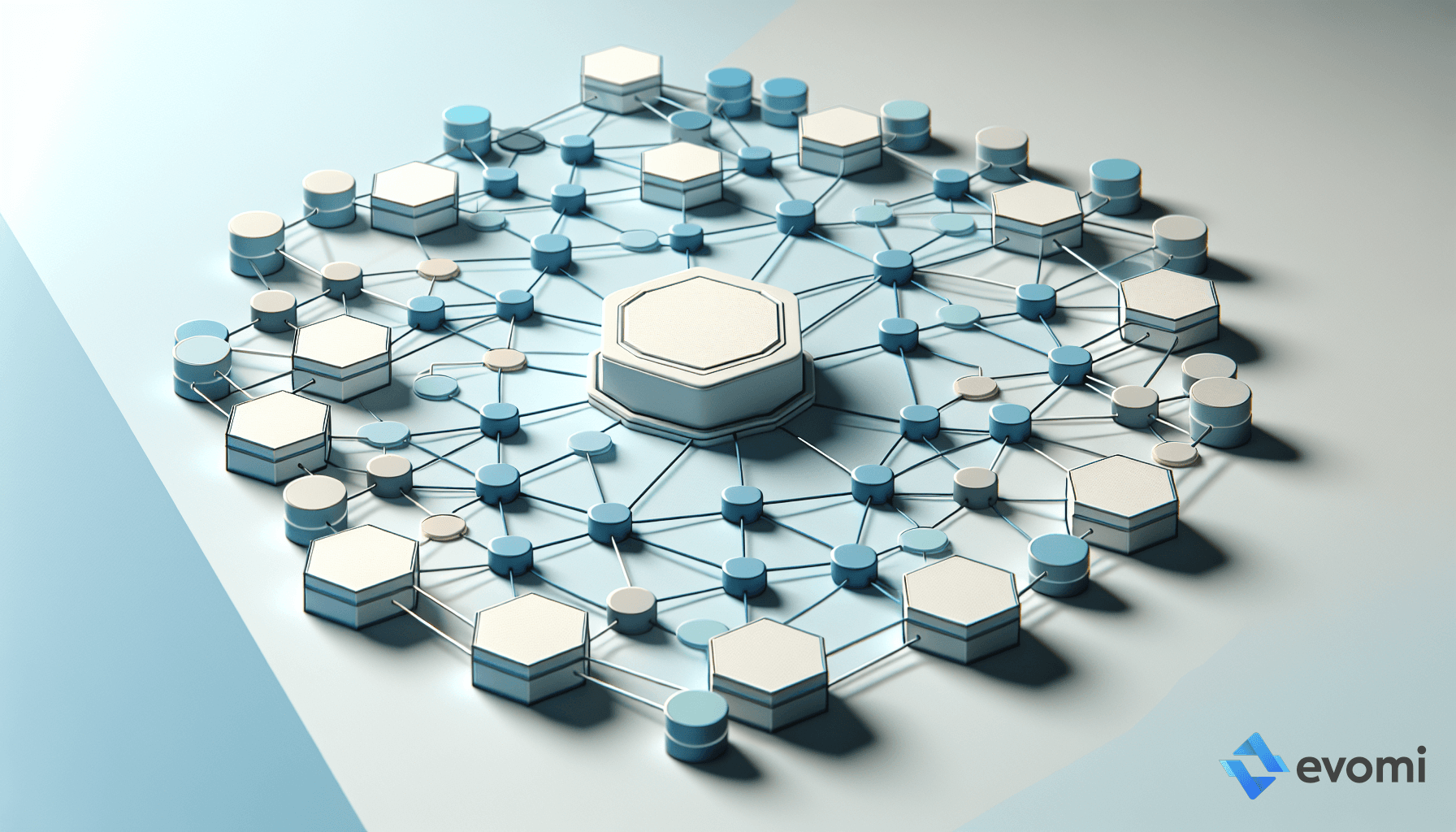IPv6 Proxies: Navigating Internet Addressing




David Foster
Proxy Basics
IPv6 and Proxies: Navigating the New Landscape of Internet Addressing
As the internet continues to expand, IPv6 is becoming increasingly crucial for businesses and individuals alike. But how does this new addressing system impact the world of proxies? Discover the challenges and opportunities that arise when IPv6 meets proxy technology, and learn how to stay ahead in this evolving digital landscape.
Understanding IPv6: The Next Generation of Internet Protocol
IPv6, or Internet Protocol version 6, is the most recent version of the Internet Protocol (IP), the primary communications protocol that provides an identification and location system for computers on networks and routes traffic across the Internet. Unlike its predecessor, IPv4, which uses 32-bit addresses and can support about 4.3 billion unique addresses, IPv6 uses 128-bit addresses and can support approximately 340 undecillion (3.4 × 10^38) unique addresses.
The transition to IPv6 was necessitated by the rapid growth of internet-connected devices, which quickly exhausted the available IPv4 address space. With the advent of the Internet of Things (IoT) and the increasing number of mobile devices, the need for a larger address space became critical. IPv6 not only solves this problem but also brings additional benefits such as improved security features, better quality of service, and simplified network configuration.
The Impact of IPv6 on Proxy Services
The introduction of IPv6 has significant implications for proxy services. Proxies, which act as intermediaries between clients and servers, play a crucial role in various business operations, including data collection, web scraping, and maintaining online anonymity. As the internet transitions to IPv6, proxy providers must adapt their services to support this new protocol.
One of the most significant changes is the sheer number of available IP addresses. With IPv6, proxy providers have access to a vastly larger pool of addresses, which can lead to improved performance and reliability. This abundance of addresses also makes it easier for providers to offer dedicated IP addresses to their clients, a feature that's particularly valuable for businesses requiring consistent and unique online identities.
However, the transition to IPv6 also presents challenges. Many websites and online services still primarily support IPv4, which means proxy providers need to maintain compatibility with both protocols. This dual-stack approach ensures that clients can access all parts of the internet, regardless of the underlying protocol.
IPv6 and Geolocation: New Opportunities for Targeted Data Collection
One of the interesting aspects of IPv6 is its potential impact on geolocation services. In the IPv4 world, geolocation based on IP addresses has become a standard practice for many businesses, used for everything from targeted advertising to content localization. With IPv6, the relationship between IP addresses and physical locations could become even more precise.
IPv6 addresses are designed with a hierarchical structure that includes network topology information. This structure could potentially allow for more accurate geolocation, down to a more specific area or even a particular building. For businesses using proxies for data collection or market research, this increased precision could be a game-changer, allowing for more targeted and relevant data gathering.
However, it's important to note that this level of precision also raises privacy concerns. As proxy service providers, we at Evomi are committed to balancing the needs of our business clients with ethical considerations and privacy standards. We ensure that our services comply with all relevant regulations and respect user privacy while still providing the level of detail and accuracy our clients need for their operations.
Security Implications of IPv6 for Proxy Users
IPv6 brings several security enhancements that can benefit proxy users. One of the most notable is the mandatory implementation of IPsec (Internet Protocol Security). IPsec provides end-to-end encryption and authentication, which can significantly improve the security of data transmitted over the internet.
For businesses using proxies for sensitive operations like data collection or competitive analysis, this added layer of security is crucial. It helps protect against man-in-the-middle attacks and ensures the integrity and confidentiality of the data being transmitted. At Evomi, we leverage these security features to provide our clients with a robust and secure proxy service that they can rely on for their critical business operations.
However, it's worth noting that the transition to IPv6 also introduces new security challenges. The vast address space of IPv6 makes traditional IP scanning techniques less effective, which could potentially make it harder to detect malicious activities. This emphasizes the importance of choosing a reputable proxy provider that implements strong security measures and actively monitors for potential threats.
Adapting to IPv6: Strategies for Businesses
As the internet continues its transition to IPv6, businesses need to adapt their strategies to make the most of this new protocol. For companies that rely on proxies for their operations, this adaptation is particularly crucial. Here are some strategies to consider:
Ensure IPv6 Compatibility: If you're using proxy services for your business operations, make sure your chosen provider supports IPv6. At Evomi, we offer full IPv6 support across our residential, datacenter, and mobile proxy services, ensuring that our clients are ready for the IPv6 future.
Leverage Increased Address Space: The vast number of available IPv6 addresses opens up new possibilities for proxy usage. Consider how you can use this increased address space to improve your data collection or web scraping operations.
Prepare for Enhanced Geolocation: As IPv6 potentially allows for more precise geolocation, think about how this could benefit your business. Could more accurate location data improve your market research or help you better target your services?
Prioritize Security: Take advantage of the security enhancements that come with IPv6. Ensure that your proxy provider implements these features and consider how you can integrate them into your overall security strategy.
Stay Informed: The transition to IPv6 is an ongoing process. Stay informed about the latest developments and how they might impact your use of proxy services.
Conclusion: Embracing the IPv6 Future
The transition to IPv6 represents a significant shift in the internet landscape, with far-reaching implications for businesses that rely on proxy services. While this transition brings challenges, it also offers exciting opportunities for improved performance, enhanced security, and more precise data collection.
At Evomi, we're committed to staying at the forefront of these technological advancements. Our proxy services are fully IPv6 compatible, ensuring that our clients are well-positioned to take advantage of the benefits of this new protocol. Whether you're using proxies for data intelligence, SEO optimization, or any other business-critical operation, we're here to support you in navigating this new landscape.
As we move further into the IPv6 era, businesses that adapt quickly and effectively will gain a competitive edge. By understanding the implications of IPv6 for proxy services and implementing strategies to leverage its benefits, you can ensure that your business is ready for the future of the internet.
Interested in learning more about how our IPv6-ready proxy services can benefit your business? Check out our pricing or get in touch with our team for a free trial. Let's navigate the IPv6 future together.
IPv6 and Proxies: Navigating the New Landscape of Internet Addressing
As the internet continues to expand, IPv6 is becoming increasingly crucial for businesses and individuals alike. But how does this new addressing system impact the world of proxies? Discover the challenges and opportunities that arise when IPv6 meets proxy technology, and learn how to stay ahead in this evolving digital landscape.
Understanding IPv6: The Next Generation of Internet Protocol
IPv6, or Internet Protocol version 6, is the most recent version of the Internet Protocol (IP), the primary communications protocol that provides an identification and location system for computers on networks and routes traffic across the Internet. Unlike its predecessor, IPv4, which uses 32-bit addresses and can support about 4.3 billion unique addresses, IPv6 uses 128-bit addresses and can support approximately 340 undecillion (3.4 × 10^38) unique addresses.
The transition to IPv6 was necessitated by the rapid growth of internet-connected devices, which quickly exhausted the available IPv4 address space. With the advent of the Internet of Things (IoT) and the increasing number of mobile devices, the need for a larger address space became critical. IPv6 not only solves this problem but also brings additional benefits such as improved security features, better quality of service, and simplified network configuration.
The Impact of IPv6 on Proxy Services
The introduction of IPv6 has significant implications for proxy services. Proxies, which act as intermediaries between clients and servers, play a crucial role in various business operations, including data collection, web scraping, and maintaining online anonymity. As the internet transitions to IPv6, proxy providers must adapt their services to support this new protocol.
One of the most significant changes is the sheer number of available IP addresses. With IPv6, proxy providers have access to a vastly larger pool of addresses, which can lead to improved performance and reliability. This abundance of addresses also makes it easier for providers to offer dedicated IP addresses to their clients, a feature that's particularly valuable for businesses requiring consistent and unique online identities.
However, the transition to IPv6 also presents challenges. Many websites and online services still primarily support IPv4, which means proxy providers need to maintain compatibility with both protocols. This dual-stack approach ensures that clients can access all parts of the internet, regardless of the underlying protocol.
IPv6 and Geolocation: New Opportunities for Targeted Data Collection
One of the interesting aspects of IPv6 is its potential impact on geolocation services. In the IPv4 world, geolocation based on IP addresses has become a standard practice for many businesses, used for everything from targeted advertising to content localization. With IPv6, the relationship between IP addresses and physical locations could become even more precise.
IPv6 addresses are designed with a hierarchical structure that includes network topology information. This structure could potentially allow for more accurate geolocation, down to a more specific area or even a particular building. For businesses using proxies for data collection or market research, this increased precision could be a game-changer, allowing for more targeted and relevant data gathering.
However, it's important to note that this level of precision also raises privacy concerns. As proxy service providers, we at Evomi are committed to balancing the needs of our business clients with ethical considerations and privacy standards. We ensure that our services comply with all relevant regulations and respect user privacy while still providing the level of detail and accuracy our clients need for their operations.
Security Implications of IPv6 for Proxy Users
IPv6 brings several security enhancements that can benefit proxy users. One of the most notable is the mandatory implementation of IPsec (Internet Protocol Security). IPsec provides end-to-end encryption and authentication, which can significantly improve the security of data transmitted over the internet.
For businesses using proxies for sensitive operations like data collection or competitive analysis, this added layer of security is crucial. It helps protect against man-in-the-middle attacks and ensures the integrity and confidentiality of the data being transmitted. At Evomi, we leverage these security features to provide our clients with a robust and secure proxy service that they can rely on for their critical business operations.
However, it's worth noting that the transition to IPv6 also introduces new security challenges. The vast address space of IPv6 makes traditional IP scanning techniques less effective, which could potentially make it harder to detect malicious activities. This emphasizes the importance of choosing a reputable proxy provider that implements strong security measures and actively monitors for potential threats.
Adapting to IPv6: Strategies for Businesses
As the internet continues its transition to IPv6, businesses need to adapt their strategies to make the most of this new protocol. For companies that rely on proxies for their operations, this adaptation is particularly crucial. Here are some strategies to consider:
Ensure IPv6 Compatibility: If you're using proxy services for your business operations, make sure your chosen provider supports IPv6. At Evomi, we offer full IPv6 support across our residential, datacenter, and mobile proxy services, ensuring that our clients are ready for the IPv6 future.
Leverage Increased Address Space: The vast number of available IPv6 addresses opens up new possibilities for proxy usage. Consider how you can use this increased address space to improve your data collection or web scraping operations.
Prepare for Enhanced Geolocation: As IPv6 potentially allows for more precise geolocation, think about how this could benefit your business. Could more accurate location data improve your market research or help you better target your services?
Prioritize Security: Take advantage of the security enhancements that come with IPv6. Ensure that your proxy provider implements these features and consider how you can integrate them into your overall security strategy.
Stay Informed: The transition to IPv6 is an ongoing process. Stay informed about the latest developments and how they might impact your use of proxy services.
Conclusion: Embracing the IPv6 Future
The transition to IPv6 represents a significant shift in the internet landscape, with far-reaching implications for businesses that rely on proxy services. While this transition brings challenges, it also offers exciting opportunities for improved performance, enhanced security, and more precise data collection.
At Evomi, we're committed to staying at the forefront of these technological advancements. Our proxy services are fully IPv6 compatible, ensuring that our clients are well-positioned to take advantage of the benefits of this new protocol. Whether you're using proxies for data intelligence, SEO optimization, or any other business-critical operation, we're here to support you in navigating this new landscape.
As we move further into the IPv6 era, businesses that adapt quickly and effectively will gain a competitive edge. By understanding the implications of IPv6 for proxy services and implementing strategies to leverage its benefits, you can ensure that your business is ready for the future of the internet.
Interested in learning more about how our IPv6-ready proxy services can benefit your business? Check out our pricing or get in touch with our team for a free trial. Let's navigate the IPv6 future together.
IPv6 and Proxies: Navigating the New Landscape of Internet Addressing
As the internet continues to expand, IPv6 is becoming increasingly crucial for businesses and individuals alike. But how does this new addressing system impact the world of proxies? Discover the challenges and opportunities that arise when IPv6 meets proxy technology, and learn how to stay ahead in this evolving digital landscape.
Understanding IPv6: The Next Generation of Internet Protocol
IPv6, or Internet Protocol version 6, is the most recent version of the Internet Protocol (IP), the primary communications protocol that provides an identification and location system for computers on networks and routes traffic across the Internet. Unlike its predecessor, IPv4, which uses 32-bit addresses and can support about 4.3 billion unique addresses, IPv6 uses 128-bit addresses and can support approximately 340 undecillion (3.4 × 10^38) unique addresses.
The transition to IPv6 was necessitated by the rapid growth of internet-connected devices, which quickly exhausted the available IPv4 address space. With the advent of the Internet of Things (IoT) and the increasing number of mobile devices, the need for a larger address space became critical. IPv6 not only solves this problem but also brings additional benefits such as improved security features, better quality of service, and simplified network configuration.
The Impact of IPv6 on Proxy Services
The introduction of IPv6 has significant implications for proxy services. Proxies, which act as intermediaries between clients and servers, play a crucial role in various business operations, including data collection, web scraping, and maintaining online anonymity. As the internet transitions to IPv6, proxy providers must adapt their services to support this new protocol.
One of the most significant changes is the sheer number of available IP addresses. With IPv6, proxy providers have access to a vastly larger pool of addresses, which can lead to improved performance and reliability. This abundance of addresses also makes it easier for providers to offer dedicated IP addresses to their clients, a feature that's particularly valuable for businesses requiring consistent and unique online identities.
However, the transition to IPv6 also presents challenges. Many websites and online services still primarily support IPv4, which means proxy providers need to maintain compatibility with both protocols. This dual-stack approach ensures that clients can access all parts of the internet, regardless of the underlying protocol.
IPv6 and Geolocation: New Opportunities for Targeted Data Collection
One of the interesting aspects of IPv6 is its potential impact on geolocation services. In the IPv4 world, geolocation based on IP addresses has become a standard practice for many businesses, used for everything from targeted advertising to content localization. With IPv6, the relationship between IP addresses and physical locations could become even more precise.
IPv6 addresses are designed with a hierarchical structure that includes network topology information. This structure could potentially allow for more accurate geolocation, down to a more specific area or even a particular building. For businesses using proxies for data collection or market research, this increased precision could be a game-changer, allowing for more targeted and relevant data gathering.
However, it's important to note that this level of precision also raises privacy concerns. As proxy service providers, we at Evomi are committed to balancing the needs of our business clients with ethical considerations and privacy standards. We ensure that our services comply with all relevant regulations and respect user privacy while still providing the level of detail and accuracy our clients need for their operations.
Security Implications of IPv6 for Proxy Users
IPv6 brings several security enhancements that can benefit proxy users. One of the most notable is the mandatory implementation of IPsec (Internet Protocol Security). IPsec provides end-to-end encryption and authentication, which can significantly improve the security of data transmitted over the internet.
For businesses using proxies for sensitive operations like data collection or competitive analysis, this added layer of security is crucial. It helps protect against man-in-the-middle attacks and ensures the integrity and confidentiality of the data being transmitted. At Evomi, we leverage these security features to provide our clients with a robust and secure proxy service that they can rely on for their critical business operations.
However, it's worth noting that the transition to IPv6 also introduces new security challenges. The vast address space of IPv6 makes traditional IP scanning techniques less effective, which could potentially make it harder to detect malicious activities. This emphasizes the importance of choosing a reputable proxy provider that implements strong security measures and actively monitors for potential threats.
Adapting to IPv6: Strategies for Businesses
As the internet continues its transition to IPv6, businesses need to adapt their strategies to make the most of this new protocol. For companies that rely on proxies for their operations, this adaptation is particularly crucial. Here are some strategies to consider:
Ensure IPv6 Compatibility: If you're using proxy services for your business operations, make sure your chosen provider supports IPv6. At Evomi, we offer full IPv6 support across our residential, datacenter, and mobile proxy services, ensuring that our clients are ready for the IPv6 future.
Leverage Increased Address Space: The vast number of available IPv6 addresses opens up new possibilities for proxy usage. Consider how you can use this increased address space to improve your data collection or web scraping operations.
Prepare for Enhanced Geolocation: As IPv6 potentially allows for more precise geolocation, think about how this could benefit your business. Could more accurate location data improve your market research or help you better target your services?
Prioritize Security: Take advantage of the security enhancements that come with IPv6. Ensure that your proxy provider implements these features and consider how you can integrate them into your overall security strategy.
Stay Informed: The transition to IPv6 is an ongoing process. Stay informed about the latest developments and how they might impact your use of proxy services.
Conclusion: Embracing the IPv6 Future
The transition to IPv6 represents a significant shift in the internet landscape, with far-reaching implications for businesses that rely on proxy services. While this transition brings challenges, it also offers exciting opportunities for improved performance, enhanced security, and more precise data collection.
At Evomi, we're committed to staying at the forefront of these technological advancements. Our proxy services are fully IPv6 compatible, ensuring that our clients are well-positioned to take advantage of the benefits of this new protocol. Whether you're using proxies for data intelligence, SEO optimization, or any other business-critical operation, we're here to support you in navigating this new landscape.
As we move further into the IPv6 era, businesses that adapt quickly and effectively will gain a competitive edge. By understanding the implications of IPv6 for proxy services and implementing strategies to leverage its benefits, you can ensure that your business is ready for the future of the internet.
Interested in learning more about how our IPv6-ready proxy services can benefit your business? Check out our pricing or get in touch with our team for a free trial. Let's navigate the IPv6 future together.

Author
David Foster
Proxy & Network Security Analyst
About Author
David is an expert in network security, web scraping, and proxy technologies, helping businesses optimize data extraction while maintaining privacy and efficiency. With a deep understanding of residential, datacenter, and rotating proxies, he explores how proxies enhance cybersecurity, bypass geo-restrictions, and power large-scale web scraping. David’s insights help businesses and developers choose the right proxy solutions for SEO monitoring, competitive intelligence, and anonymous browsing.





